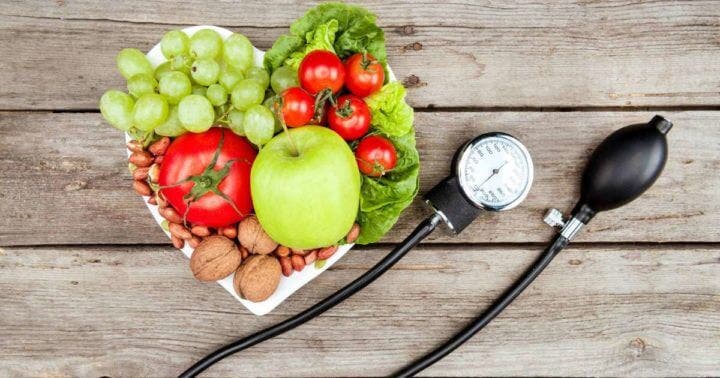Following a diet to lose weight is not always easy. Avoiding unnecessary sacrifices is precisely what the nutritious diet aims to avoid in the first place, a dietary alternative designed by doctor and nutritionist Joel Fuhrman, which promises to help you regain your figure without too much effort.
The Nutritious Diet provides impressive health benefits such as weight loss, disease reversal, delaying aging, and increasing life expectancy. Discover everything you need to know about this comprehensive nutrition plan through this guide.

What is the nutritious diet?
The nutritious diet is an eating pattern created by Dr. Joel Fuhrman, first published in his 2003 book “Eat to Live.” This diet is vegan, gluten free, low in sodium and low in fat. The diet also avoids or minimizes processed foods, and focuses on eating nutrient-dense foods that are rich in vitamins, minerals, fiber, and antioxidants.
The doctor first proposes a 6-Week Plan and then a Life Plan to lose weight, achieve physical and emotional well-being, live longer and in better health. He describes it as “a biochemical and physiological transformation that will change you forever.” According to the author, you will overcome addictions to food and achieve a physiological “cleansing”. In addition, 10 kilos can be lost in 6 weeks.
A nutritionist understands that food produces powerful therapeutic effects that protect against disease, and that is why he tries to consume a wide variety of micronutrients through the products he chooses to eat “, writes the doctor in his book” Eating to live. “

How to follow the nutritious diet?
The key is to choose the nutrients that satisfy our appetite and, at the same time, improve the body’s ability to repair itself. These are the elements that you must include.
Raw vegetables
Eat as much as possible, trying to reach 450 grams per day, divided between breakfast, lunch and dinner. Peas, red bell peppers, carrots, tomatoes, and cucumbers are recommended. “Raw foods have a longer transit time; that’s why they fill you up and encourage you to lose weight, ”says Dr. Fuhrman.
Cooked vegetables
You should also try to reach 450 grams per day of cooked vegetables, divided between breakfast, lunch and dinner, such as aubergines, mushrooms, peppers, onions, tomatoes, carrots and cauliflower.

Vegetables
A whole cup a day of chickpeas, beans, lentils or soybeans. “They stabilize blood sugar, suppress the desire for sweets and prevent the craving to eat between meals, particularly in the afternoon,” says the expert.
Fruit
4 pieces of fresh fruit a day should be eaten. according to this doctor. The best options are: apple, apricot, banana, blackberry, blueberry, grape, kiwi, mango, melon, peach, orange, tangerine, papaya, pear, pineapple, plum, and raspberry. However, juicing them is not recommended.
“Taking the fruit in the form of juice makes you consume three times more calories, but you lose all the fiber that regulates absorption”, says the specialist.
All of these foods should be consumed no more than three times a day and you can use all the spices and herbs you want to season, except for salt. However, there are other foods whose consumption is possible, but limited, such as products with corn, potatoes, rice, bread and cereals, allowing you only one cup a day. It is also advisable to eliminate snacks and replace them with fruits.

Does a nutritious diet help you lose weight?
The nutritious diet is likely to help you lose weight for several reasons: it is naturally high in fiber and restricts the amount of high-calorie foods you eat, both of which can promote weight loss.
This diet also restricts calorie intake by limiting high-calorie foods such as eggs, meat, dairy products, oil, and processed foods high in sugar, all potential foods that help you gain weight.
By discouraging snacking, dieting can also cause some people to naturally eat fewer calories throughout the day.

Benefits of a nutritious diet
Being a diet based mainly on fruits, vegetables and legumes, it therefore has many health benefits. In addition, the goal of losing weight in a short time is achieved, since the foods that it prioritizes are very low calories. Apart from this main effect, it has other specific benefits
1. It can improve heart health
A nutritious diet can reduce risk factors for heart disease such as high cholesterol and blood pressure levels.
In one study, 328 people with untreated high cholesterol experienced a 25% reduction in LDL (bad) cholesterol after following the nutritional diet for 3 years (Fuhrman, J. and Singer, M. (2017).

2. Can stabilize blood sugar levels
The nutritious diet is rich in fiber , low in added sugar, and designed to promote low-glycemic foods. Low-glycemic foods are digested more slowly and are less likely to raise blood sugar levels.

3. Has anti-inflammatory effects
The nutritious diet is essentially a strict form of an anti-inflammatory diet and is packed with foods that contain phytochemicals, vitamins, minerals, and much more to boost the immune system and protect against lifestyle-related diseases such as diabetes, heart disease and cancer.
Plant-based diets that are rich in minimally processed foods and healthy fats, such as the Nutritious Diet, can increase your lifespan and improve your overall health.

Disadvantages of the nutritious diet
1. It is difficult to maintain
The nutritious diet is probably one of the strictest diets I have ever reviewed. Nutrient deficiencies such as B12, calcium, and vitamin D are highly likely, unless you purchase a supplement from Dr. Fuhrman’s online store.
Strict food rules pose a concern for people with a history of eating disorders, and because most foods must be prepared at home, people on this diet may experience some feelings of social isolation.

2. Restrict nutrient-rich foods
The nutritious diet limits many foods that are considered healthy, such as whole grains, olive oil, yogurt, and eggs.
Of course, consuming too much of any food is not good, especially in the case of foods that are high in sodium, saturated fat, or sugar, but Dr. Fuhrman’s dietary guidelines are based on fairly extreme interpretations of research and such. Restrictions can make it unnecessarily difficult to meet your daily needs for certain nutrients.

3. Risk of gaining weight
This diet promises that you will lose large amounts of weight in very short periods of time, usually an average of 1.5 kg per week, but research shows that such severe caloric restriction can slow metabolism and trigger muscle loss. It can also promote hunger and increase the risk of regaining all lost weight, and even more (Jiménez et al., 2015; Muller et al., 2015).
Combining the low calorie intake with the mindset of such a restrictive diet will likely lead you to get discouraged and throw in the towel.

Conclution
This plan can be good for a person who wants to see how a limited vegan diet might work for them; however, for other people, such as those with a history of disordered eating behaviors, who don’t have time to prepare all meals at home, or those with increased protein, sodium, or other specific needs, they should probably avoid it.
Those who try this diet should start off knowing that it is not sustainable for everyone in the long term and that it is only a temporary quick fix to losing weight .
References
- Fuhrman, J. and Singer, M. (2017). Improved Cardiovascular Parameter With a Nutrient-Dense, Plant-Rich Diet-Style: A Patient Survey With Illustrative Cases. American Journal of Lifestyle Medicine. doi: 10.1177 / 1559827615611024
- Jiménez, J., Leiva, B., Acevedo, B., Cueva de la Maza, M., Hirsch Birn, S., Henríquez, S., Rodríguez. J. and Bunout, D. (2015). Effect of calorie restriction on energy expenditure in overweight and obese adult women. Hospital nutrition. doi: 10.3305 / nh.2015.31.6.8782
- Müller, M., Enderle, J., Pourhassan, M., Braun, W., Eggeling, B., Lagerpusch, M., Glüer, C…, (2015). Metabolic adaptation to caloric restriction and subsequent refeeding: the Minnesota Starvation Experiment revisited. The American Journal of Clinical Nutrition . DOI: 10.3945 / ajcn.115.109173